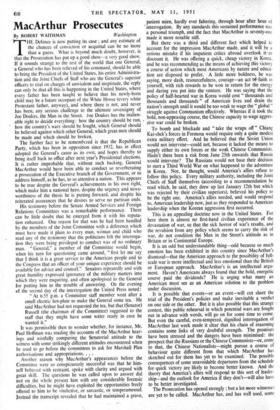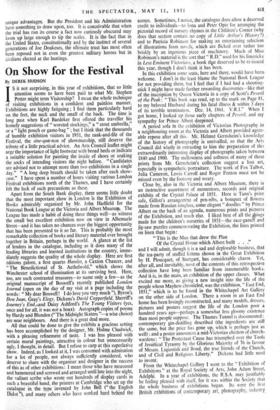MacArthur Prosecutes
By ROBERT WA1THMAN
Washington HE Defence is now putting its case ; and any estimate of the chances of conviction or acquittal can be no ntore than a guess. What is beyond much doubt, however, is that the Prosecution has put up a good show—a very good show. If it sounds strange to the rest of the world that one General, a General who has been relieved of his command, should be able to bring the President of the United States, his entire Administra- tion and the Joint Chiefs of Staff who are the General's superior officers to trial on charges of unwisdom and ineptitude, the reply can only be that all this is happening in the United States, where every father has been taught to believe that his newly-born child may be a future occupant of the White House (every white Protestant father, anyway),, and where there is not, and never has been, any serious challenge to the ultimate sovereignty of Joe Doakes, the Man in the Street. Joe Doakes has the inalien- able right to decide everything: how the country should be run, how the country's wars should be fought. which General should be believed against which other General, which great men should be made and which should be broken.
The further fact to be remembered is that the Republican Party, which has been in opposition since 1932, has in effect adopted the General's cause as its own, and hopes thereby to bring itself back to office after next year's Presidential elections. It is rather improbable that, without such backing, General MacArthur would have been able to conduct so reverberating a prosecution of the Executive branch of the Government, or to address himself, as he has, to so attentive a nation. This appears to be true despite the General's achievements in his own right, which make him a national hero, despite the urgency and news- worthiness of the thesis he is putting forward, and despite his reiterated assurances that he desires to serve no partisan ends.
His testimony before the Senate Armed Services and Foreign Relations Committees was a remarkable performance. There can be little doubt that he emerged from it with his reputa- tion enhanced. One reason for that was he had been handled by the members of the Joint Committee with a deference which must have made it plain to every man, woman and child who read any of the testimony that the politicians felt the interroga- tion they were being privileged to conduct was of no ordinary man. 'General," a member of the Committee would begin, when his turn for questioning came around. "first let me say that I think it is a great service to the American people and to the Congress that an officer of your unique experience should be available for advice and counsel." Senators repeatedly and with great humility expressed ignorance of the military matters into which they were enquiring. and often apologised to the General for putting him to the trouble of answering. On the evening of the second day of the interrogation the United Press noted: "At 6.55 p.m. a Committee staff member went after a small electric hot-plate to make the General some tea. He said MacArthur had not requested the tea, but that (Senator) Russell (the chairman of the Committee) suggested to the staff that they might have some water ready in case he wanted it."
it was permissible then to wonder whether, for instance, Mr. Paul Hoffman was reading the accounts of the MacArthur hear- ings and wistfully comparing the Senatorial attitude to the witness with some strikingly different attitudes encountered when he used to go before the committees to ask for Marshall Plan authorisations and appropriations.... Another reason why MacArthur's appearances before the Committee were so conspicuously successful was that he him- self behaved with restraint, spoke with clarity and argued with great skill. The questions he was called upon to answer did not on the whole present him with any considerable forensic difficulties, but he might have exploited the opportunities freely offered to him to be vindictive, or sarcastic, or temperamental. Instead the transcript revealed that he had maintained a grave, patient mien, hardly ever faltering, through hour after hour of 'interrogation. By any standards this sustained performance was a personal triumph, and the fact that MacArthur is seventy-one made it more notable still.
But there was a third and different fact which helped to account for the impression MacArthur made, and it will be a serious mistake if his impatient critics abroad overlook it-or discount it. He was offering a quick, cheap victory in Korea, and he was recommending as the means of achieving this victory a course of action which most Americans by nature and educa- tion are disposed to prefer. A little more boldness, he was saying, more dash, resourcefulness, courage—an act bf-faith in yourself, with rich rewards to be won in return for the energy and daring you put into the venture. He was saying that the policy of half-hearted war in Korea would cost "thousands and thousands and thousands" of American lives and drain the nation's strength until it would be too weak to wage the " global " struggle against Communism effectively. Whereas if it took the bold, non-appeasing course, the Chinese capacity to wage aggres- sive war could be broken.
To bomb and blockade and "take the wraps off" Chiang Kai-shek's forces in Formosa would require only a quite modest extra military effort. And he believed that the.Soviet Union would not intervene—could not, because it lacked the means to supply either its own forces or the weak Chinese Communists. Hadn't there been a risk from June 25th onwards that Russia would intervene? The Russians would not base their decision to start a Third World War on what happened to the adventure in Korea. Nor, he thought, would America's allies refuse to follow this policy. Every military authority, including the Joint Chiefs of Staff themselves (according to a recommendation he read which, he said, they drew up last January 12th but which was rejected by their civilian superiors), believed his policy to be the right one. America's allies needed, and would respond to, American leadership now, just as they responded to American leadership when the Korean aggression first occurred.
This is an appealing doctrine now in the United States. For here there is almost no first-hand civilian experience of the devastation of war, SQ that the sick horror of war's results, and the revulsion from any policy which seems to carry the risk of war, do not condition the Man in the Street's attitude as in Britain or in Continental Europe.
It is an odd but understandable thing—odd because so much emotion has been exhibited in this country since MacArthur's dismissal—that the American approach to the possibility of full- scale war is more intellectual and less emotional than the British or European approach. MacArthur's is an intellectual argu- ment. Haven't Americans always found that the bold, energetic course paid the dividends? He is urging what many an American must see as an American solution to the problem under discussion.
It is possible that events—or an event—will cut short the trial of the President's policies and make inevitable a verdict on one side or the other. But it is also possible that this strange ■ contest, this public rehearsal in which potential wars are fought out in advance with words, will go on for some time to come. But even the careful, even-tempered, dignified interrogation of MacArthur last week made it clear that his chain of reasoning contains some links of very doubtful strength. The promises have been stressed and the dangers have been minimised: the prospect that the Russians or the Chinese Communists—or, come to that, the Chinese Nationalists—might pursue a course of behaviour quite different from that which MacArthur has sketched out for them has yet to be examined. The possible consequences of some unavoidable departures from the schedule for quick victory are likely to become better known. And the - theory that America's allies will respond to this sort of leader- ship—and the outlook for America if they don't—will also have to be better investigated.
The Prosecution has opened strongly : but a lot more witnesses are yet to be called. MacArthur has, and has well used, some unique advantages. But the President and his Administration have something to draw upon, too. It is conceivable that when the trial has run its course a fact now curiously obscured may loom up large enough to tip the scales. It is the fact that in the United States, constitutionally and by the instinct of several generations of Joe Doakeses, the ultimate trust has most often been reposed not in even the greatest military heroes but in civilians elected at the hustings.



































 Previous page
Previous page